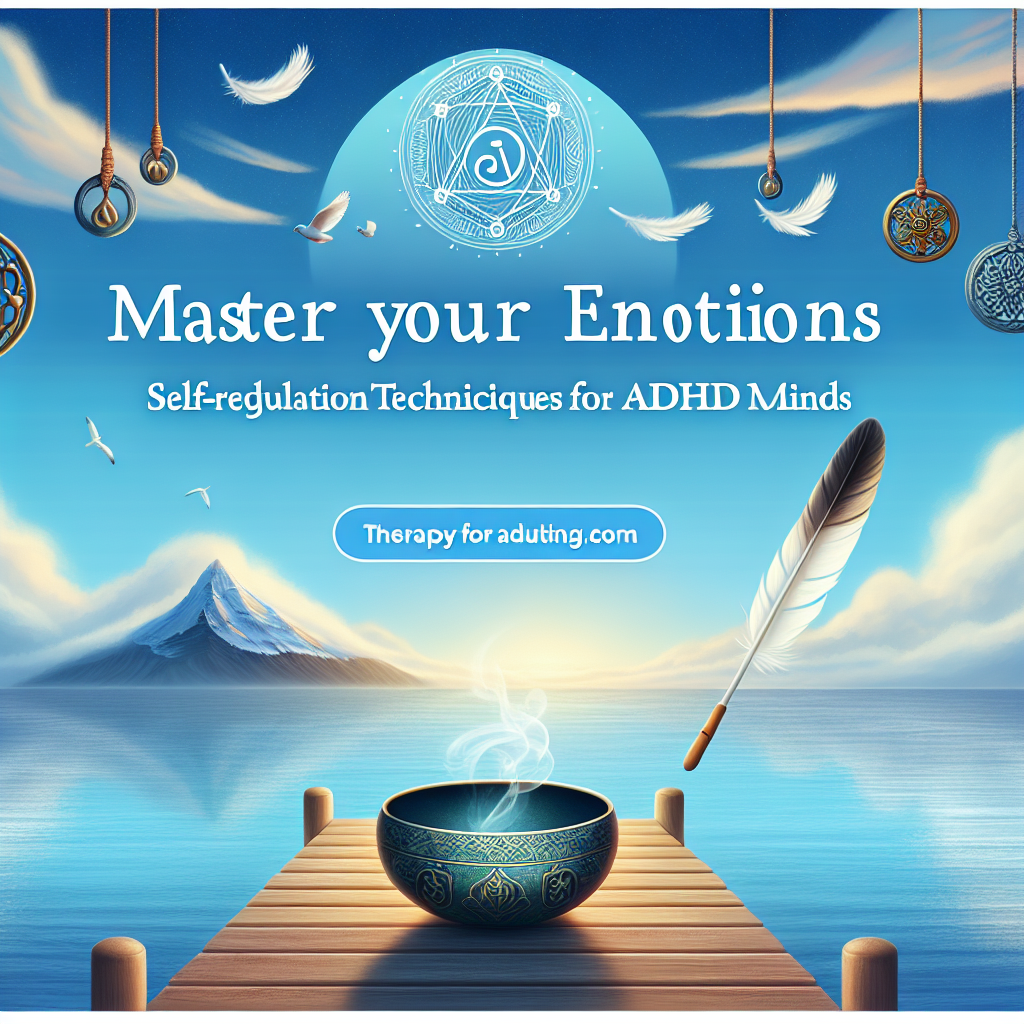
How to Choose the Right ADHD Specialist for Your Journey
Introduction
Embarking on the journey to find the right therapist specializing in ADHD can feel a bit like searching for the remote you lost somewhere between the couch cushions and last week’s laundry. It’s a daunting task, but once you’ve found the missing piece, everything just clicks into place. ADHD, or Attention-Deficit/Hyperactivity Disorder, is more than just misplacing things; it’s about navigating life’s complexities while your mind is doing its best impression of a lightning storm.
Choosing the right ADHD specialist is a crucial step in managing and thriving with ADHD as an adult. Without proper treatment, adults with untreated ADHD often face significant challenges in areas like work, relationships, and even day-to-day life (NIMH). So how do you avoid playing musical chairs with therapists until you find “the one” who truly gets it?
The First Step: Understanding Your Needs
- Are you looking for someone who offers ADHD therapy for adults, or do you need guidance on managing work-related stress?
- Would online sessions be more convenient? Consider exploring online ADHD therapy sessions.
- Do you prefer a therapist who can implement holistic approaches or perhaps cognitive behavioral therapy?
Once you’ve got a handle on what you’re looking for, it’s time to dive into the sea of options out there. From licensed ADHD counselors to those providing specialized psychotherapy or even family-inclusive strategies, there’s something for everyone. Think of this phase as building your mental health Avengers team.
Navigating Your Options: What to Look For
- Pediatric ADHD therapist: Crucial if you’re seeking help for your child or need family-based therapeutic interventions.
- Adult ADHD counseling: Essential for individuals seeking personalized treatment plans that cater specifically to adult needs.
- Support groups for ADHD sufferers: Sometimes talking it out with others who “get it” can offer perspectives no YouTube video can match.
- Cognitive behavioral therapy for ADHD: An approach backed by research that focuses on developing practical skills and strategies.
The world of ADHD treatment specialists is vast and varied, much like the channels on your streaming service (minus that last-minute cancellation). But choosing wisely will set you up not just to manage symptoms but to thrive. Dive into this process with curiosity and optimism—your perfect fit is out there waiting!
Assess Your Specific Needs and Goals
Choosing the right therapist specializing in ADHD starts with understanding exactly what you need. It’s like shopping for shoes; you wouldn’t wear hiking boots to a beach party, right? Here’s your starter guide:
- Define Your Challenges: Are you primarily grappling with focus issues, emotional regulation, or maybe a bit of both? Understanding your emotional landscape is crucial for picking the right therapy path.
- Identify Your Therapy Preferences: Do you seek a more traditional approach like cognitive behavioral therapy (CBT) or are you leaning towards newer methods such as neurofeedback? Each has its own flavor and benefits.
- Consider Lifestyle Compatibility: If you’re always on the go or simply prefer pajamas over pants—no judgment here—then online ADHD therapy sessions might be your speed.
- Evaluate Family Involvement: Is involving family in the process important to you? If so, look for therapists who offer family therapy for ADHD as part of their services.
A recent survey by CHADD (Children and Adults with Attention-Deficit/Hyperactivity Disorder) found that adults with ADHD benefit greatly from personalized treatment plans tailored to their unique needs (source). So, whether it’s breaking free from those pesky procrastination habits or learning how to manage anxiety, aligning your goals with a certified ADHD therapist can make all the difference.
If you’re not quite sure where to start, consider reading more about how various approaches can aid in different areas of life. For instance, our article on ways to stop losing stuff when living with ADHD is a good place to begin unraveling your specific needs.
The journey of choosing an ADHD counselor isn’t one-size-fits-all—but armed with clarity on your needs and goals, you’re already halfway there!
Research Different Types of Specialists
Embarking on the journey to find a “therapist specializing in ADHD” can feel as daunting as adulting itself, but fear not! With a bit of legwork (or web work), you’ll be one step closer to the support you deserve. Think of it like playing detective—but with less trench coats and more browser tabs.
Understanding the Types of ADHD Specialists
- Pediatric ADHD Therapist: These professionals primarily work with children and teens, but their skills can be invaluable if your journey involves family dynamics or if you’re seeking insights from childhood experiences.
- ADHD Treatment Specialist: Armed with knowledge about various treatment options, they offer personalized ADHD treatment plans tailored to your unique needs.
- Cognitive Behavioral Therapy (CBT) Experts: Specializing in strategies to change negative thought patterns and behaviors, these therapists are like personal trainers for your brain.
- Licensed ADHD Counselors: These are certified professionals who provide therapy sessions focused on managing ADHD symptoms effectively.
- Online ADHD Therapy Sessions: Perfect for those who prefer the comfort of their pajamas while tackling their challenges—because who doesn’t love getting therapy from their couch?
The Power of a Good Research Strategy
The key to finding the right fit involves understanding what each specialist brings to the table. Scrutinize their experience levels and treatment approaches by sifting through profiles or websites. For additional insights, check out our blog on how ADD therapy for adults can help with emotion control:
Read more here.
You’ve Got This!
If you’re feeling overwhelmed, remember it’s okay. You’re not alone; many adults are navigating this path alongside you. Join support groups for ADHD sufferers or engage in family therapy for ADHD to bolster your network.
A final tip: don’t hesitate to reach out and ask potential therapists about their approaches. A good therapist will welcome your questions—because choosing the right partner in your mental health journey is crucial for progress tracking and overall success.
Explore Therapy Options and Approaches
Embarking on the journey to find the right therapist specializing in ADHD can feel a bit like choosing a dish from an extensive buffet—overwhelming at first, but oh-so rewarding once you find the right flavor for your palate. Let’s dive into some of the therapy options available for adults grappling with ADHD.
1. Cognitive Behavioral Therapy (CBT) for ADHD
The go-to superstar on the therapy stage, CBT is all about helping you identify negative thought patterns and tweak them into positive actions. It’s no wonder that this method is often hailed as one of the most effective approaches for managing ADHD symptoms. Whether you’re troubled by procrastination or battling impulsivity, CBT offers structured sessions designed to build strategies that enhance focus and organization.
2. Online ADHD Therapy Sessions
In our fast-paced digital age, convenience is king. Online therapy sessions can be a lifesaver (or at least a time-saver). Imagine getting expert guidance from a certified ADHD therapist without ever having to change out of your pajama pants! This option not only saves you travel time but also provides access to a broader range of specialists who might not be available in your local area.
3. Holistic Approaches to ADHD Treatment
If you’re interested in a treatment that addresses mind, body, and spirit, holistic therapies might just hit the spot. These approaches could include everything from meditation and yoga to dietary changes and mindfulness techniques aimed at improving attention and reducing stress levels.
4. Neurofeedback Therapy for ADHD
This innovative approach involves real-time monitoring of brain activity with the aim of teaching self-regulation skills directly. While it might sound like something out of a sci-fi novel, neurofeedback has shown promising results as an adjunctive treatment alongside more traditional methods.
5. Family Therapy for ADHD
An ADHD diagnosis doesn’t just affect you; it impacts those around you too. Family therapy sessions can help loved ones understand what you’re dealing with and strategize together on how best to support one another.
- Counseling Services: Offers emotional support while tackling issues like low self-esteem and anxiety management.
- Personalized Treatment Plans: Tailored specifically to your needs and progress tracked over time to ensure ongoing success.
- Support Groups: Connect with others who truly “get it” because they’re walking similar paths themselves.
The world of ADHD counseling services is vast, full of diverse approaches ready to cater uniquely to your individual needs. Remember—there’s no one-size-fits-all solution here! Explore different options until you find what resonates with you on this extraordinary journey towards better mental health.
Check Credentials and Experience
When you’re setting out on your quest to find the perfect therapist specializing in ADHD, it’s essential to ensure that your chosen professional has the right credentials and experience. After all, you wouldn’t trust a chef without a toque to whip up an authentic French soufflé, would you? Let’s dive into some key pointers for vetting your potential ADHD ally.
- Verify Licensure: Your therapist should be licensed in your state or country. This is non-negotiable, folks! You can usually verify licensure through your local board’s website.
- Credentials Matter: Look for certifications that show expertise in treating ADHD specifically. Terms like “certified ADHD therapist” or “licensed ADHD counselor” are golden! If they’ve got those, you’re on the right track.
- Experience Counts: Ask about their experience with adult ADHD counseling. How many years have they been practicing? Do they have any special training in cognitive behavioral therapy for ADHD? These details matter as much as finding a parking spot on a busy street—crucial!
- Diverse Treatment Options: A seasoned pro will offer various treatments, from neurofeedback therapy for ADHD to personalized ADHD treatment plans. For a deeper understanding, you might want to explore our detailed guide on ADHD/ADD Therapy for Adults: What You Need to Know.
Diving Deeper into Expertise
If you’re looking for someone who can offer more than just textbook advice, seek out an expert in ADHD management with hands-on experience in behavior modification interventions and tailored coping skills strategies. According to Psychology Today, combining medication with behavioral therapy has proven highly effective for adults dealing with ADHD symptoms.
Your therapist should not only help you navigate your unique experiences but also engage in ongoing assessments and progress tracking to ensure that their approach is working effectively. Remember, it’s okay (and encouraged) to ask potential therapists about their approach—interview them like you’re Oprah! This is your life we’re talking about here.
The right fit will feel like slipping into a favorite pair of jeans—comfortable yet supportive where it counts most. For more tips on navigating this journey, check out our article on how ADHD Therapy Can Improve Your Memory. Let’s make this search as straightforward as possible and ace adulting together!
Consider Practicalities and Accessibility
Choosing the perfect therapist specializing in ADHD isn’t just about finding someone with the right clinical expertise—it’s also about finding someone who fits effortlessly into your life. Let’s face it, juggling the demands of adulting can be a circus act on its own. That’s why considering logistical factors is crucial.
Location, Location, Location
If you’re consistently typing “ADHD therapist near me” into Google, you already know that proximity matters. Whether it’s a quick drive or a short bus ride, ease of access can make or break your consistency in attending sessions. But hey, don’t just settle for convenience over quality—there are other options like online ADHD therapy sessions that bring the expert to you—directly from your favorite couch!
Schedule Compatibility
- Earlies vs. Night Owls: Are you a coffee-powered morning person or do you come alive after sunset? Make sure your therapist has times that fit your natural rhythm.
- Work-Life Balance: Does your 9-to-5 leave room for self-care? If not, weekend or after-hours slots can be lifesavers.
- Cancellations and Rescheduling: Life throws curveballs; check if your therapist has flexibility around appointment changes.
The Financial Aspect
The cost of therapy is a significant consideration for many. When exploring ADHD counseling services, verify if they align with your budget. Check whether the specialist accepts insurance or offers sliding scale fees to make therapy more accessible. Remember, investing in mental health is as vital as paying rent—it’s essential for staying afloat in this adulting thing!
Learn how ADHD therapy helps with adulting challenges here.
Avoiding Accessibility Pitfalls
The best therapist for ADHD understands that accessibility goes beyond physical location and hours. Consider therapists who offer options like text reminders (because who doesn’t forget appointments?), video consultations, and adaptable communication methods tailored for ADHD needs.
As adults navigating both ADHD and life’s challenges, making these practical considerations ensures that accessing care becomes one less hurdle in our busy lives. Ready to dive deeper into how therapy can transform your journey? Check out how it helps with managing negative self-talk when you have ADHD [here](https://www.therapyforadulting.com/managing-negative-self-talk-when-you-have-adhd-add/).
Evaluate Compatibility and Comfort Level
Embarking on the journey to find a therapist specializing in ADHD is like dating in the adulting world—it’s essential to swipe right on someone who clicks with you! Here’s how to ensure your potential therapist is a perfect match for your ADHD needs:
1. Trust Your Gut Feeling
Your instinct often knows what your mind doesn’t. When you meet an ADHD therapist near me, pay attention to your initial feelings. Do you feel heard and understood? If yes, they might be the right choice. If they remind you more of a school principal with a long list of “don’ts,” it might be best to look elsewhere.
2. Communication Style Matters
- Clarity and Simplicity: Does the therapist explain things in a way that makes sense? With ADHD, clear communication is key.
- Empathy and Patience: A good therapist should display patience and empathy, especially when discussing complex topics or strategies like managing negative self-talk.
3. Check Their Experience with Adult ADHD Therapy
An ideal candidate should not only have experience in ADHD therapy for adults, but also understand the unique challenges of adult life, such as managing responsibilities and working through emotional hurdles. This knowledge can provide valuable insights into personalized treatment plans.
4. Comfort Level with Treatment Options
A well-rounded specialist will offer various treatment options, from cognitive behavioral therapy for ADHD to exploring holistic approaches that suit your lifestyle and preferences. Feeling at ease discussing these options is crucial for effective therapy.
5. Is Humor Part of Their Toolkit?
Laughter can be therapeutic! A therapist who uses humor appropriately can make sessions enjoyable while helping you tackle serious issues effectively—because sometimes adulting feels like starring in a sitcom.
The goal is finding someone who feels more like a guide than just another appointment on your calendar—a professional ally who’s invested in your growth beyond simply treating symptoms.
If you’re ready to take the next step, learn more about how ADHD therapy for adults can help keep you on track.
Conclusion
Choosing the right therapist specializing in ADHD is like finding a dance partner who knows all your quirks and still doesn’t step on your toes. It’s about aligning with someone who truly understands the nuances of adult ADHD and can guide you on this intricate journey.
With untreated ADHD potentially leading to significant challenges in school, work, and relationships (source), it’s vital to find support tailored to your needs. Here are some final tips to keep in mind:
- Pace yourself: Remember, finding the best therapist for ADHD isn’t a sprint. Take your time to interview potential specialists and gauge how comfortable you feel with them.
- Consider therapy options: From cognitive behavioral therapy for ADHD to neurofeedback therapy for ADHD, explore various approaches and decide what resonates most with you.
- Assess progress regularly: Ensure that your ADHD treatment plan includes ongoing assessments and progress tracking. It’s like checking your GPS while driving—ensures you’re headed in the right direction!
Your journey may also bring moments of humor (think of it as life’s way of adding flavor!). Embrace them as part of the process, and don’t hesitate to lean on support groups for ADHD sufferers along the way. After all, every step counts toward a more balanced life where adulting feels a tad less overwhelming.
If you’re curious about how adult ADHD counseling or therapy can specifically help with emotion control or even improve memory, feel free to explore our other resources such as how ADHD therapy can improve memory.
Remember, this journey is yours and having the right guide by your side can make all the difference.
Choosing the right ADHD specialist is a crucial step towards managing your symptoms effectively. By assessing your needs, researching different specialists, exploring various therapy options, checking credentials, considering practicalities, and evaluating compatibility, you’ll be better equipped to find a professional who can guide you on this journey. Remember that finding the best therapist for ADHD is not just about qualifications but also about feeling supported throughout your mental health journey.


